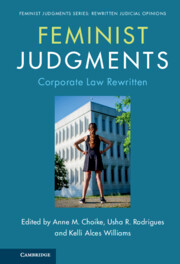Book contents
- Feminist Judgments: Corporate Law Rewritten
- Feminist Judgments Series Editors
- Advisory Panel for Feminist Judgments Series
- Feminist Judgments: Corporate Law Rewritten
- Copyright page
- Dedication
- Contents
- Advisory Panel for Feminist Judgments: Corporate Law Rewritten
- Notes on Contributors
- Acknowledgments
- About the Cover Art
- Table of Cases
- Part I Introduction and Overview
- Part II Legal Personality, Identity, and Limited Liability of Corporate Entities
- Part III Role and Purpose of the Corporation and Corporate Combinations in Society
- Part IV Fiduciary Duties in Corporate Governance
- 8 Commentary on Meinhard v. Salmon
- 9 Commentary on Smith v. Van Gorkom
- 10 Commentary on White v. Panic
- 11 Commentary on Francis v. United Jersey Bank
- 12 Commentary on In re The Walt Disney Co. Derivative Litigation
- Part V Closely Held Businesses and Other Considerations Regarding the Composition of Boards, Management, and Owners
- Part VI Protecting Investors and Potential Investors in Corporations
- Part VII From Foundations to Future Directions
- Index
11 - Commentary on Francis v. United Jersey Bank
from Part IV - Fiduciary Duties in Corporate Governance
Published online by Cambridge University Press: 15 January 2023
- Feminist Judgments: Corporate Law Rewritten
- Feminist Judgments Series Editors
- Advisory Panel for Feminist Judgments Series
- Feminist Judgments: Corporate Law Rewritten
- Copyright page
- Dedication
- Contents
- Advisory Panel for Feminist Judgments: Corporate Law Rewritten
- Notes on Contributors
- Acknowledgments
- About the Cover Art
- Table of Cases
- Part I Introduction and Overview
- Part II Legal Personality, Identity, and Limited Liability of Corporate Entities
- Part III Role and Purpose of the Corporation and Corporate Combinations in Society
- Part IV Fiduciary Duties in Corporate Governance
- 8 Commentary on Meinhard v. Salmon
- 9 Commentary on Smith v. Van Gorkom
- 10 Commentary on White v. Panic
- 11 Commentary on Francis v. United Jersey Bank
- 12 Commentary on In re The Walt Disney Co. Derivative Litigation
- Part V Closely Held Businesses and Other Considerations Regarding the Composition of Boards, Management, and Owners
- Part VI Protecting Investors and Potential Investors in Corporations
- Part VII From Foundations to Future Directions
- Index
Summary
Mrs. Pritchard became the director of a family-owned reinsurance firm, Pritchard & Baird Intermediaries Corp (P & B), following the death of her husband. Mrs. Pritchard’s two sons were executives of the company, which eventually went bankrupt. The plaintiff, trustee of the P & B’s bankruptcy estate, filed this suit against the deceased Mrs. Pritchard’s estate claiming she was negligently liable as director for the over $10 million her sons improperly removed from the firm. The feminist rewrite agrees with the original opinion that Mrs. Pritchard was negligent in her role of corporate oversight, but it deviates by arguing Mrs. Pritchard was not negligent for failure to notice the financial issues because she should not have been expected to understand the intricacies of the business of which she served mostly as the figurehead and emotional glue. The rewritten opinion points out the implicit bias built within the New Jersey directors’ duty statute, which refers to “prudent men.” The commentary argues Mrs. Pritchard chose not to extend great care because she was not compensated or given much actual power within P & B. The commentary also critiques the rewritten opinion’s dismissiveness of Mrs. Pritchard’s corporate knowhow as not feminist enough.
Keywords
- Type
- Chapter
- Information
- Feminist Judgments: Corporate Law Rewritten , pp. 266 - 300Publisher: Cambridge University PressPrint publication year: 2023

